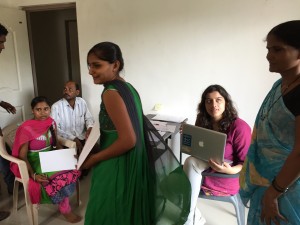Exploring Her Culture Sparks New Inspiration and Hope
Learn more about one of our 2015 interns, Sonia, and her personal connections to the goals of Nanubhai.
In the northeastern part of this country, there is a tiny state called Meghalaya where the society is
structured around the roots and traditions of matriarchy. Once married, men reside in the house of their
mother-in-law, instead of the son inheriting the family heirlooms and wealth, the youngest daughter
does and children usually take their mother’s surname instead of their fathers. For a minute, let’s move
to the state of Uttar Pradesh in northern India where the Gulaabi Gang takes pride in protecting the
women. The Gulaabi Gang was founded by Mrs. Sampat Lal in 2006 in a district enveloped which thrived
on domestic violence, female illiteracy and patriarchy. The group was founded to combat the violence
and provide women with opportunities. Most of the members of the Gulaabi Gang wore pink sarees and
carried around long wooden sticks to protect themselves. From the north, we slowly visit our home
state of Gujarat. The SEWA movement was initiated by Mrs. Elaben Bhatt of Ahmedabad and the
movement helped rural women gain fulltime employment and become financially independent. The
examples above are just a few examples which define the opportunities women have made for
themselves and thrived on in this country. Beneath the pseudo-feminist version of “Indian women are
always oppressed” lies a prosperous society controlled and led by women. A society I grew up in.
I consider myself American but I grew up in India. Bombay has been my home for as long as I can
remember and my American boarding school in the Palni Hills of rural Tamil Nadu gave and taught me
more than I can ever imagine. Yet, I thought that there was something missing in my book of
experiences and I saw myself applying for an internship in a state I never thought I would be able to
visit. Gujarat. Yes, that’s right, I am Gujarati, I speak, read and write Gujarati but I never took any
particular pride in the cultural and religious aspects and traditions. In my eyes, I am Indian. Still, when I
came across an organization which offered young Gujarati women a chance to make something of their
lives, I was fascinated and I knew that I wanted to, and I could contribute. In big cities like Bombay and
Delhi, most girls can attend college for free, simply because of their gender. I realized that such
opportunities did not really exist in the recent developments which Gujarat went through. I dropped my
camp counselor position in New Hampshire and my internship with ASER India and signed up for rural
Gujarat instead.
Bardoli, where the organization is located reminds me of Cairo, with the cows and the buffaloes on the
road. It is very similar and still very different. The view of our terrace looks similar to the border city of
Amritsar. The chai shops on the road remind me of a desert highway in Amman, Jordan. Bardoli feels
like a microcosm of many other places I have lived in and known. Gujarat is not a place I want to fall in
love with or make my home; I rather make it a symbol of hope. So much hope. I feel that rush of
optimism every time I go through the biographies of girls who have received scholarships to continue
with their education. Deep down, I knew I could have been in their place if my family had never left this
state for good. I could have been the one applying for a scholarship. I take pride in the fact that so many
Gujarati women are stepping up to build a foundation of courage and expectation. I don’t know what
the next few days will bring but I can’t wait to find out xD

